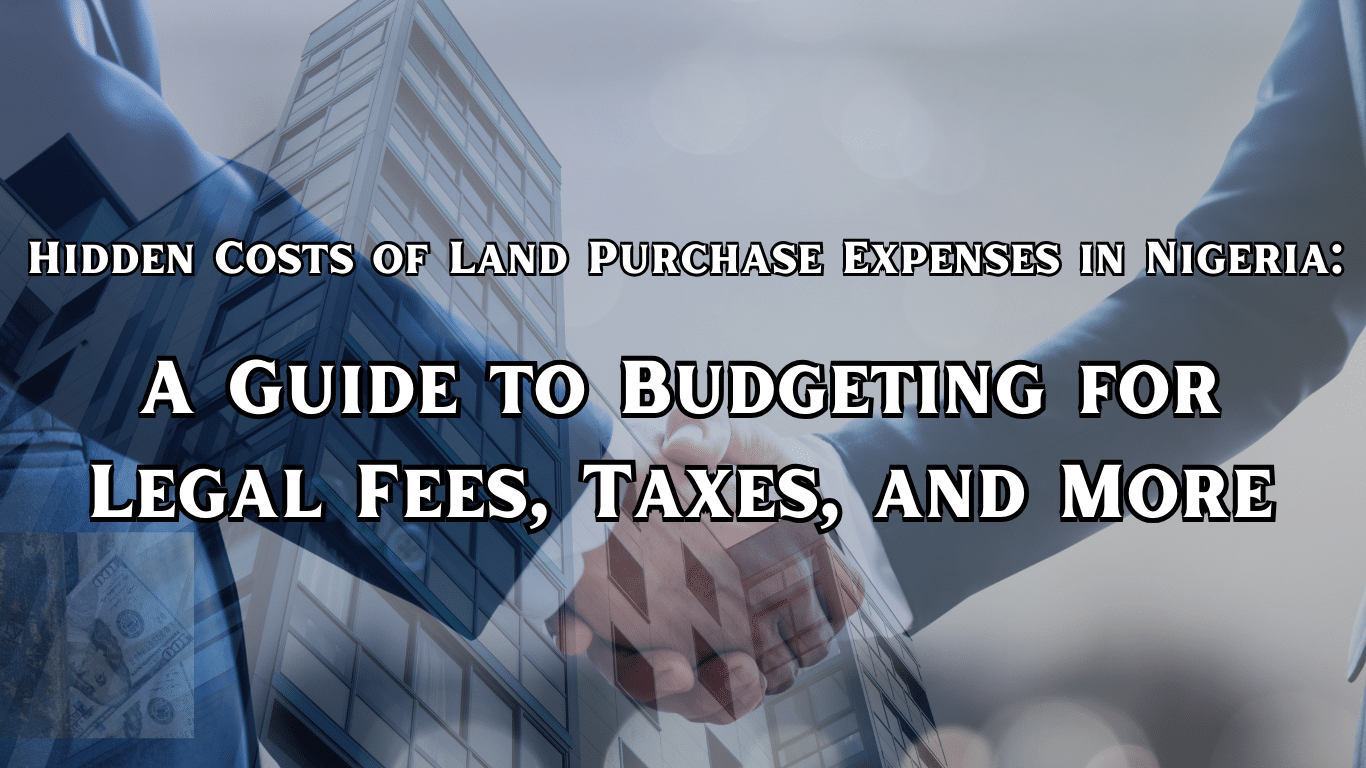In Nigeria, buying land is a major milestone and often a big financial commitment. However, many buyers focus primarily on the purchase price, overlooking the hidden land purchase expenses that can significantly affect their overall investment. Understanding these additional costs is crucial for accurate budgeting and avoiding unexpected surprises. In this blog, we’ll explore the hidden costs of buying land in Nigeria and share tips to help you manage them effectively.
1. Legal Fees and Documentation Costs
One of the first land purchase expenses you’ll encounter in Nigeria involves legal fees and documentation:
- Legal Fees: It’s essential to hire a lawyer who understands Nigerian land laws to guide you through the process. Legal fees cover critical tasks such as verifying land ownership, conducting title searches, drafting agreements, and ensuring the transaction is legitimate. These fees typically range between 5% and 10% of the purchase price but can vary based on the complexity of the deal and the lawyer’s experience.
- Documentation Costs: In Nigeria, securing the correct land documents is non-negotiable. You’ll need to process key documents like the Certificate of Occupancy (C of O), Deed of Assignment, and Survey Plan. These documents prove ownership and prevent disputes. Depending on the location, processing these documents can cost hundreds of thousands or even millions of naira.
2. Survey and Inspection Fees
Before finalizing a land deal, conducting a proper survey and inspection is crucial in Nigeria:
- Survey Fees: A licensed surveyor will map out the exact boundaries of your property. In Nigeria, survey fees vary by state and land location, with urban areas like Lagos or Abuja typically charging higher rates. This step is essential to avoid encroaching on another person’s land or buying a plot riddled with disputes.
- Inspection Costs: Additionally, it’s important to inspect the land for any issues that may affect its value or usability. For example, you’ll want to confirm there’s no flooding risk, land contamination, or legal encumbrances. Hiring experts for land inspection may seem like an added cost, but it can save you from bigger losses down the line.
3. Transfer and Registration Fees
Once you’ve agreed on a price, there are additional fees required to finalize the transaction:
- Transfer Fees: The Nigerian government imposes charges for transferring land titles from the seller to the buyer. These fees are often calculated as a percentage of the purchase price and may differ across states.
- Registration Fees: In Nigeria, registering your property with the Land Registry is critical for legally securing your ownership. While registration fees vary depending on the state, failing to complete this step can leave your investment vulnerable to disputes.
If you want to invest in Real Estate in Nigeria, Call us or Click to send a whatsapp message
4. Taxes and Levies
Taxes and levies in Nigeria can often be overlooked but are a significant part of land acquisition:
Stamp Duty: This tax is mandatory for legalizing the transaction and is usually a percentage of the land’s purchase price or market value. Stamp duties are paid directly to the state or federal government, depending on the land’s location.
Property Levies: Depending on where the land is located, some local governments in Nigeria impose annual property taxes or levies. These could include tenement rates or community development fees, so ensure you account for them when budgeting.
5. Development and Improvement Costs
If you plan to develop the land, you should prepare for additional costs:
- Development Costs: Clearing bushes, grading the land, and creating access roads are common development expenses in Nigeria. These costs can be significant, especially for undeveloped or rural plots.
- Utility Connection Fees: Connecting basic utilities like electricity, water, or boreholes can be expensive in Nigeria, particularly in remote or underdeveloped areas. Factor in these costs if you plan to build immediately.
- Building Permits: Before construction, you’ll need permits from the local government or town planning authority. Skipping this process in Nigeria could lead to hefty fines or even demolition orders.
6. Maintenance and Upkeep Costs
After buying the land, maintaining it is just as important:
- Maintenance Costs: For vacant land, you may need to pay for regular clearing to prevent overgrowth or trespassing. If the land is in a high-risk area, you might also need security to protect your investment.
- Land Insurance: Though not common in Nigeria, land insurance can protect your property against unforeseen events like disputes or fraud. Premiums depend on the land’s location and value but can provide peace of mind in the long run.
If you want to invest in Real Estate in Nigeria, Call us or Click to send a whatsapp message
Conclusion
In Nigeria, the hidden land purchase expenses can quickly add up and significantly affect your budget. Legal fees, survey and inspection costs, transfer and registration fees, taxes, development costs, and maintenance expenses are all critical factors to consider.
By thoroughly researching these costs and working with reliable professionals, you can avoid surprises and make informed decisions. Ultimately, understanding the true cost of land acquisition in Nigeria will empower you to secure a safe, profitable investment and achieve your land ownership goals.



